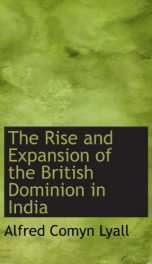the rise of the british dominion in india

Purchase of this book includes free trial access to www.million-books.com where you can read more than a million books for free. This is an OCR edition with typos. Excerpt from book: CHAPTER III. CONSOLIDATION OF THE ENGLISH EAST INDIA COMPANY (1690-1702). SECTION I. Comiition and importance of the East Indian trade. For the English East India Company the last years of the seventeenth century had been a period of not untroubled transition from a purely commercial system toward a kind of elementary local self-government. The increasing weakness of the Moghul empire doubled the risks and uncertainty of their trade; producing constant alarms from the fighting that went on near their settlements, liability to plunder and incessant exactions, exposure to interference from interlopers, and danger of encroachment or attack from European rivals. They had now deliberately adopted the plan of endeavouring to rid themselves of dependence on the native authorities ; and their agents were enjoined to spare no pains for improving their revenue. ' The increase of our revenue,' they wrote in 1690, ' is the subject of our care as much as our trade; t'is that must maintain our force when twenty accidents may interrupt our trade; t'is that must make us a nation in India . . . and upon this account it is that the wise Dutch, in all their general advices that we have seen, write ten paragraphs concerning their government, their civil and military policy, warfare, and the increase of their revenue, for one paragraph they write concerning trade.' These instructions show that, to use an Oriental metaphor, the scent of dominion was already in the nostrils of the English Company, that they were by this time on the track of higher game than the profits of trade. At Madras and Bombay their fortifications were in fair condition, although their troops, beside a few Europeans, were chiefly a rabble of Armenians, Arabs, negroes, and half-bred Portuguese. In Bengal the imperial vicer...
Info about the book
Author:
Series:
Unknown
ISBN:
0199297673
Rating:
5/5 (1)Your rating:
0/5
Languge:
English
Users who have this book
Users who want this book
What readers are saying
What do you think? Write your own comment on this book!
write a commentGenre
if you like the rise of the british dominion in india try:
Do you want to exchange books? It’s EASY!
Get registered and find other users who want to give their favourite books to good hands!







